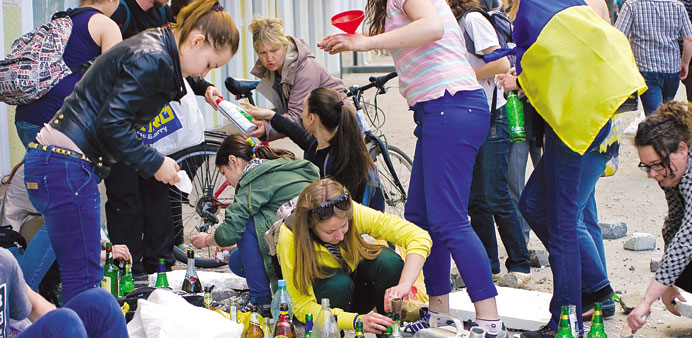Young women, supporters of ‘Single Ukraine’, prepare Molotov cocktails during clashes with pro-Russian protesters in downtown Odessa.
AFP/DPA/Reuters/Slaviansk
Russia called an emergency UN Security Council meeting, the 13th since the crisis in Ukraine began, after at least seven people were killed in a Ukrainian military assault on the flashpoint town of Slaviansk (also called Slavyansk and Sloviansk), the deadliest day for months in the escalating crisis.
A furious Kremlin said that the raid was “leading Ukraine towards catastrophe” and pronounced dead a peace deal struck in Geneva last month to ease the worst East-West confrontation since the Cold War.
Russian Prime Minister Dmitry Medvedev urged the Western-backed leaders in Kiev to “stop killing their citizens”, saying that the raid was “a sign of criminal helplessness”.
In a day of violence that dramatically escalated the Ukraine crisis, three people were shot dead in the southern port city of Odessa, as pro-Russian militants clashed with supporters of Ukrainian unity.
Ukraine’s interim president Oleksandr Turchynov said “many rebels” had been killed in the pre-dawn raid on the eastern town of Slaviansk and confirmed the loss of two military personnel after insurgents shot down two helicopters.
Rebels later said three of their number and two citizens were killed in what they said was a “full-scale attack” and vowed to defend the town, which has become the epicentre of tension in increasingly volatile eastern Ukraine.
At the emergency UN talks, Russia warned Ukraine of “catastrophic consequences” unless it halted a military operation against pro-Russian gunmen.
Ukraine’s Western-backed government has accused Russia of fomenting the rebellion and has launched a military operation to seize control of the flashpoint town of Slaviansk.
“If the criminal misadventures of Kiev are not swiftly stopped then catastrophic consequences for Ukraine cannot be avoided,” Russian Ambassador Vitaly Churkin told the 15-member Council.
He rounded on Kiev and its Western allies, accusing the United States of “blatant” double standards and claiming that English-speaking foreigners were interfering on the ground.
Demanding a halt to “all punitive operations”, he said: “It is time for Western colleagues to think twice.”
Secretary General Ban Ki-moon reiterated grave concern and called for maximum restraint to avoid more bloodshed, saying that a diplomatic solution was the only way out of the crisis.
“Escalating violence and reported further loss of life in the city of Slaviansk today is a stark reminder of how dangerous the situation has become,” he said in a statement.
But Western powers expressed full support for Ukraine’s military operation designed to reclaim one town from an armed uprising.
The United States said Russian-directed agents and paramilitaries were responsible for “horrible violence” and accused of Moscow of trying to “replicate the charade” that led to its annexation of Crimea.
Russian expressions of concern were “cynical and disingenuous”, said US Ambassador Samantha Power.
Ukraine’s response is “reasonable, it is proportional and it is frankly what any one of our countries would have done”, she said.
“These are dangerous days for Ukraine and all of us,” Power added.
British Ambassador Mark Lyall Grant called on Russia “to step back from such rhetoric, to desist from their inflammatory propaganda and commit to de-escalating a perilous situation”.
“There is no council member sitting at this table that would allow its towns to be overrun by armed militants,” he said.
“The scale of Russian hypocrisy is breathtaking,” he added, accusing Moscow of arming the most repressive regimes in the world, including its ally Syria.
“Russia’s synthetic indignation of Ukraine’s proportionate and measured actions convinces no one,” he said.
He said “peaceful activists” as claimed by Russia do not have the means to shoot down Ukrainian helicopters.
“Sophisticated weaponry against Ukrainian forces reaffirms our assessment that the armed groups include professionals funded and equipped by Russia,” Grant said.
Yesterday US President Barack Obama said that the United States would move to “sectoral sanctions” on Russia if Moscow impeded plans for elections in Ukraine later this month.
Obama was speaking to reporters at the White House joint news conference after talks with German Chancellor Angela Merkel, who also supported a move to wider sanctions and said that the European Union and the United States would continue to work in concert on the issue.
“The next step is going to be a broader-based sectoral sanctions regime,” Obama said.
Merkel agreed, saying that May 25 was a critical date and “we will see to it that elections can take place”.
The United States and the EU have imposed several rounds of sanctions on individuals and some companies to try to persuade Russian President Vladimir Putin to halt any interference in Russian-speaking areas of eastern Ukraine.
Energy and banking sectors are two of the most likely areas if those sanctions are widened.
“In Europe, we have taken a decision that (should) further destabilisation happen, we will move to a third stage of sanctions. I would like to underline this is not necessarily what we want, but we are ready and prepared to go to such a step,” Merkel said.
Obama said the purpose of sanctions was not to punish Russia, but to give it an incentive “to choose a better path”.
The two leaders said they were united in their desire to impose costs on Russia for its actions in Ukraine and for backing Ukraine, including financially.

